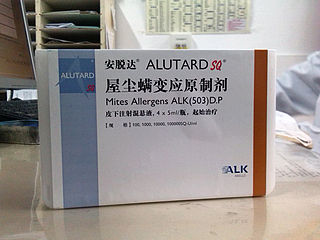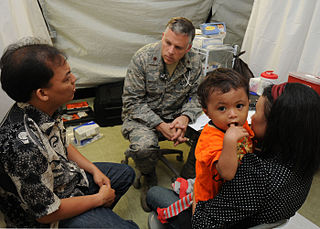
Allergies, also known as allergic diseases, are various conditions caused by hypersensitivity of the immune system to typically harmless substances in the environment. These diseases include hay fever, food allergies, atopic dermatitis, allergic asthma, and anaphylaxis. Symptoms may include red eyes, an itchy rash, sneezing, coughing, a runny nose, shortness of breath, or swelling. Note that food intolerances and food poisoning are separate conditions.
An allergen is an otherwise harmless substance that triggers an allergic reaction in sensitive individuals by stimulating an immune response.
Anaphylaxis is a serious, potentially fatal allergic reaction and medical emergency that is rapid in onset and requires immediate medical attention regardless of the use of emergency medication on site. It typically causes more than one of the following: an itchy rash, throat closing due to swelling that can obstruct or stop breathing; severe tongue swelling that can also interfere with or stop breathing; shortness of breath, vomiting, lightheadedness, loss of consciousness, low blood pressure, and medical shock. These symptoms typically start in minutes to hours and then increase very rapidly to life-threatening levels. Urgent medical treatment is required to prevent serious harm and death, even if the patient has used an epipen or has taken other medications in response, and even if symptoms appear to be improving.

The American Heart Association (AHA) is a nonprofit organization in the United States that funds cardiovascular medical research, educates consumers on healthy living and fosters appropriate cardiac care in an effort to reduce disability and deaths caused by cardiovascular disease and stroke. They are known for publishing guidelines on cardiovascular disease and prevention, standards on basic life support, advanced cardiac life support (ACLS), pediatric advanced life support (PALS), and in 2014 issued the first guidelines for preventing strokes in women. The American Heart Association is also known for operating a number of highly visible public service campaigns starting in the 1970s, and also operates several fundraising events.

Allergen immunotherapy, also known as desensitization or hypo-sensitization, is a medical treatment for environmental allergies and asthma. Immunotherapy involves exposing people to larger and larger amounts of allergens in an attempt to change the immune system's response.

The jack jumper ant, also known as the jack jumper, jumping jack, hopper ant, or jumper ant, is a species of venomous ant native to Australia. Most frequently found in Tasmania and southeast mainland Australia, it is a member of the genus Myrmecia, subfamily Myrmeciinae, and was formally described and named by British entomologist Frederick Smith in 1858. This species is known for its ability to jump long distances. These ants are large; workers and males are about the same size: 12 to 14 mm for workers, and 11 to 12 mm for males. The queen measures roughly 14 to 16 mm long and is similar in appearance to workers, whereas males are identifiable by their perceptibly smaller mandibles.
The Asthma and Allergy Foundation of America (AAFA) is the leading patient organization for people with asthma and allergies and the oldest asthma and allergy patient group in the world. AAFA is dedicated to saving lives and reducing the burden of disease for people with asthma, allergies, and related conditions through research, education, advocacy, and support.
Health advocacy or health activism encompasses direct service to the individual or family as well as activities that promote health and access to health care in communities and the larger public. Advocates support and promote the rights of the patient in the health care arena, help build capacity to improve community health and enhance health policy initiatives focused on available, safe and quality care. Health advocates are best suited to address the challenge of patient-centered care in our complex healthcare system. The Institute of Medicine (IOM) defines patient-centered care as: Health care that establishes a partnership among practitioners, patients, and their families to ensure that decisions respect patients' wants, needs, and preferences and that patients have the education and support they need to make decisions and participate in their own care. Patient-centered care is also one of the overreaching goals of health advocacy, in addition to safer medical systems, and greater patient involvement in healthcare delivery and design.
Founded in 1943, the American Academy of Allergy, Asthma & Immunology (AAAAI) is a professional medical membership organization of more than 7,000 allergists/immunologists and related professionals around the world with advanced training and experience in allergy, asthma and other immunologic diseases. The Academy is dedicated to the advancement of the knowledge and practice of allergy, asthma and immunology for optimal patient care.

Food Allergy Research & Education (FARE) is a non-profit, private organization dedicated to food allergy awareness, research, education, and advocacy. FARE's goal is to enhance the lives of people with food allergies by providing support and resources to help them live safe yet productive lives. FARE also includes information for people without food allergies, who are looking to not only be respectful of others but also become more educated and gain more awareness regarding healthcare and treatments. The organization provides information, programs, and resources about food allergies and anaphylaxis, a severe, potentially life-threatening allergic reaction. Working on behalf of more than 32 million Americans who have potentially life-threatening food allergies, FARE's mission is to improve the quality of life and health of those with food allergies and to provide hope for the development of new treatments and diagnostics.
Patient recruitment is the process of finding and enrolling suitable participants for clinical trials. It is a crucial aspect of drug development and medical research, as it affects the validity, reliability, and generalizability of the results. Patient recruitment can also be challenging, time-consuming, and costly, involving various ethical, regulatory, and logistical issues.

Many species of arthropods can bite or sting human beings. These bites and stings generally occur as a defense mechanism or during normal arthropod feeding. While most cases cause self-limited irritation, medically relevant complications include envenomation, allergic reactions, and transmission of vector-borne diseases.
Asthma Canada, formerly the Asthma Society of Canada, is a non-profit charity dedicated to enhancing the quality of life and health for people living with asthma and associated allergies. It has a threefold focus on education, research, and advocacy, to continue improving lives for all those with asthma. Asthma Canada represents over 3.8 million Canadians living with asthma, along with their caregivers and all others impacted by asthma, and also provides resources for people suffering from allergies.

Alfred William "Bill" Frankland MBE was a British allergist and immunologist whose achievements included the popularisation of the pollen count as a piece of weather-related information to the British public, speculation regarding the effects of overly sterile living environments, and the prediction of increased levels of allergy to penicillin. He continued to work for a number of years after turning 100.
The Pancreatic Cancer Action Network (PanCAN) is a United States–based 501(c)(3) charity that funds research, provides patient/caregiver support, conducts community outreach and advocates for increased federal research funding for those affected by pancreatic cancer.
Sociedad Española de Inmunología Clínica, Alergología y Asma Pediátrica (SEICAP), the Spanish Society of Pediatric Allergy, Asthma and Clinical Immunology, is a scientific, non-profit organization, whose aims are to develop and disseminate the knowledge of allergic and immunologic diseases that affect children. Since June 2012 SEICAP has been recognized as a Public Interest Entity. Their field of study includes childhood asthma, rhinitis and conjunctivitis, anaphylaxis, atopic dermatitis, contact dermatitis, urticaria and angioedema, food allergy, drug allergy, allergy to latex, allergy to insect stings, primary immunodeficiency, and other disorders. These conditions are very frequent in children, especially in developed countries, and account for a considerable amount of healthcare spending, which has increased especially since the 1990s.

Cultural competence in healthcare refers to the ability for healthcare professionals to demonstrate cultural competence toward patients with diverse values, beliefs, and feelings. This process includes consideration of the individual social, cultural, and psychological needs of patients for effective cross-cultural communication with their health care providers. The goal of cultural competence in health care is to reduce health disparities and to provide optimal care to patients regardless of their race, gender, ethnic background, native languages spoken, and religious or cultural beliefs. Cultural competency training is important in health care fields where human interaction is common, including medicine, nursing, allied health, mental health, social work, pharmacy, oral health, and public health fields.
Mary Hewitt Loveless was an American physician and immunologist who specialized in allergies. She is best known for her discovery that Hymenoptera insect venom allergies could be treated with extracts of the insects' venom sacs.
The Hispanic Federation (HF) is a U.S based non-governmental organization focused on supporting Hispanic communities through local, state, and national advocacy. The Federation was founded in New York City in 1990 by a small group of Latino leaders, establishing initiatives to advocate for the interests of the Hispanic community and has expanded to establish programs, and policies in 16 states. The organization's objective is to empower and advance the Hispanic community primarily through service pillars, membership services, advocacy, and community programs. The Federation has formed relationships with a network of 100 Latino grassroots nonprofits, as well as collaborating with organizations, government officials, and private sector partners to enact systemic change related to a variety of socioeconomic issues for Hispanic communities. The Federation has gained national recognition for its work in areas of education, health, immigration, economic empowerment, civic engagement, environment, and organizational development to strengthening Latino institutions to ultimately increase the quality of life within Hispanic communities.
The Patient Access Network Foundation is a US-based non-profit 501(c)(3) organization that works to accelerate access to treatment through financial assistance, advocacy, and education. The organization was ranked #34 in Forbes' 2019 list of "top 100 US Charities", with private donations in 2019 totaling $434 million. And in 2023, PAN was named to Fast Company's third annual Brands That Matter list, which recognizes companies and organizations of any size for their relevance, cultural impact, ingenuity, and business impact.







